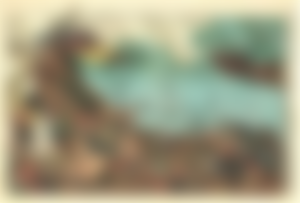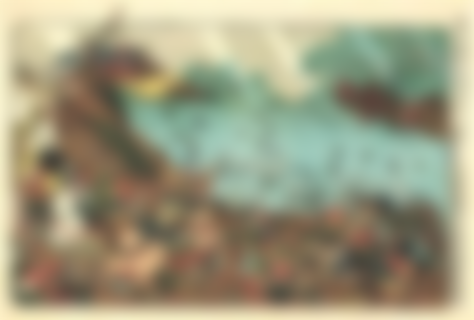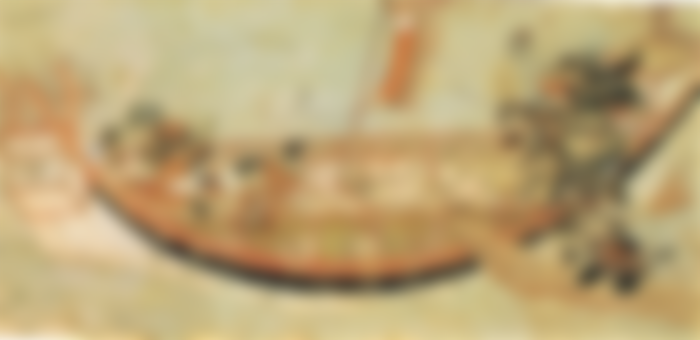Mongol emperor Kublai Khan sent troops to take over Japan in 1274 and 1281. At that time, the vast areas around China and the Mongol regime came under the rule of the Mongols. So the Mongols were tasting the ultimate taste of power. The thing was that the Mongol invasion in some areas was to take over the region.
For the traditional samurai, the war was to protect their dignity. On the other hand, the victory for Kublai Khan was to ensure their absolute dominance in the region. But the danger came to the Japanese port of Tari Sheep. The Samurai were fighting for their land and dignity. Suddenly, a miracle storm swept all the Mongols' ships! The outcome of the war changed within a moment. So the samurai story is similar to modern Japan.
In 1266, Mongol emperor Kublai Khan brought the vast territory of China, Korea and Mongolia under his control. In this situation, he was drawn to a culturally advanced Japan. He sent a letter to the emperor of Japan through the envoy. Where it was written,
" O ruler of the small town , accept me as the sovereign emperor ! "
Khan's envoy returned to China without a reply. In the next 6 years Khan sent a message to the emperor several times. Every time he replied, "Mongols cannot set foot on The ground in Japan."

In 1271, Kublai Khan defeated the Sung dynasty and established the Yuan dynasty. Then he thought that Japan had exceeded the emperor's arrogance. It's time to teach him. So, according to his advisers, he prepared a huge army of 600 ships and 40,000 soldiers. On the other hand, the army of the Japanese Samurai sat in only 10,000 troops.
In this case, Khan's ship left the Port of Masan in Korea in the autumn of 1274. On the first strike they captured parts of the Korean Peninsula and the Japanese Border and the Iki Islands. They marched east after committing genocide against the inhabitants.
On November 19, the Mongol navy reached the Gulf of Hakata. They came here to face the army of Samurai Tekzaki Suenaga. A hand-written parchment of Sweenaga says, "There was a tradition of fighting within the Samurai. That's called the Bushido Code. According to this signal, the samurai were separated from each tribe. Then they would call each other their names and their clans and face the saths! Sadly, the Mongols were not familiar with the signal. So whenever a Samurai went to Khan's army, they killed him with joy! It's like an ant.
To add to the suffering of japanese samurai, the Mongols poisoned themselves on the shore. They also started using bows that were twice the size of the Japanese bows. Like the Mongol army, the Japanese did not know the tactics of the Satru. But they started to die alone in the hands of the enemy.

Suenaga and several samurai of his army were injured in the uneven fighting. They were quickly moved from the peninsula. At night, everyone is provided with services. They were physically injured but they were still in a state of shock. So they wait in their tents for the morning. The determination to start everything anew is in the public eye. Soon after they fell asleep, the wind suddenly started blowing. Then it rains. The whole area is under water since morning.
Meanwhile, The crew of Khan's ship were too busy to return home. Their commanders are also confused by the weather conditions. They turn their own warlords to China without seeing the way. When the sea water starts to rise, everyone on the ship realizes that the danger is imminent. After the next two days, half of the Mongols' ships were sunk in the sea. And their 13,000 soldiers disappeared forever. Finally, the tired and devastated Mongols who survived returned to their homes.

Kublai Khan was in the capital, Dada (currently Beijing). He was disappointed when he heard the news. He was cursed by this cruelty of nature. And the Japanese started celebrating their sudden victory!
Traditionally, the reward of the Samurai was traditional after winning any war. But they could not rob the Mongols of this war. As a result, it was impossible to reward thousands of samurai. So only a few Samurai were rewarded in the post-war period. That led to extreme resentment among the Samurai.
In this situation, Kublai Khan sent the envoy back to Japan. But this time the Japanese did not respond to the letter. Instead, they sit on the head of the angel. Khan decided to attack Japan again. He formed a commission for that. The commission, formed in 1280, advised Khan to attack Japan the following spring.
After Khan's assassination, the Japanese began to prepare themselves for the inevitable war. The number of samurai is supplied with the weapons. They started building a 5-15-foot high wall around the Hakata Bay.
In the spring of 1281, the Japanese were ready for war again. Now they're more prepared than ever, more well-formed. The Samurai have taken their own swords. Then they prayed to The God of War, Hachiman. So that they can protect their land and heritage from the enemy.

Kublai Khan was also determined to win Japan. He knew that the natural disaster had saved Japan from him. The Japanese samurai did not show any of the sword's performances.
The Japanese have now got 40,000 Samurai soldiers. Those who are standing behind the wall built on the Hakata Peninsula. Their eyes are in the west. Mongols now divide their forces into two parts. In one part, there were 40,000 troops with Chinese, Korean and Mongoliantroops. The number of fighters of this army was 900. The army started its journey from the port of Masan. The other forces were 100,000 soldiers and 3,500 soldiers.
The Korean fleet of Mongols reached the port of Hakata on June 23, 1281. On the other hand, the war lords from China remained hidden until then. It was very difficult to attack the top of the wall from the mongols' small fleets. Yet their success is not entirely a let down. On the other hand, japanese samurai set fire to enemy's battlefields in the dark of night. It's been almost 50 days. Korean soldiers were mentally broken to be the victims of the covert attack. They had nothing to do with the Chinese fleet.

Finally, the Mongols' main ship suddenly appeared on august 12 west of the Gulf of Hakata. The army was almost twice as large as the Samurai. The army easily captured the samurai. When the samurai were no longer able to rise, they continued to fight to protect their dignity.
But what a sense of wisdom! The samurai were being crushed by the Mongols, and a miracle happened. On 15august 1281, the mysterious storm returned. The storm that destroyed Khan's war lords. The fearsome screams of the soldiers were covered by the waves. The Samurai slayed the Mongol soldiers who were returning to the shore. So the samurai who once lost hope and were being put in their own hands, now started fighting with new passion.
After the war, none of Khan's forces returned to their homeland. Many drowned while on board. And the survivors gave their lives to the samurai after they came to the shore.
To the Japanese, this victory is an extraordinary gift from their gods. As it proves, the tradition of samurai is eternal. On the other hand, Kublai Khan also beganto believe that the Japanese had a divine influence! They are being beaten up and beaten up. So he did not dare to attack there.
The traditional influence of samurai is still widespread in The Olite-Gali of Japan. So in any war or disaster, they remember their past. Thus, the Japanese have the inherent power to deal with their own problems. Long after the Mongol slaughter, the elders told the stories of heroism and miracles to their new generation. Which has become part of their literature.




